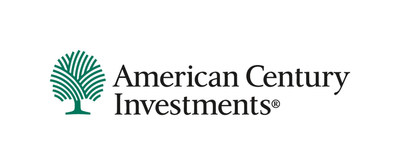UNCERTAINTY PRESENTS INVESTOR OPPORTUNITIES
In its second quarter investment outlook, American Century Investments offers insights on opportunities in a season dominated by policy and market uncertainty on tariffs, spending cuts, interest rates and more
KANSAS CITY, Mo., April 2, 2025 /PRNewswire/ -- In its second 2025 investment outlook, the $263 billion* global asset manager American Century Investments offers guidance on navigating the policy and market uncertainty on tariffs, federal spending cuts, interest rates and more. Advising patience and warning against reactionary moves, the company's investment officers see opportunities in bottom-up stock selection of high-quality businesses, especially in overlooked asset classes.
"Policy uncertainty is affecting the market's psyche. After years of Federal Reserve news dominating the market discussion, trade and fiscal maneuvering play more prominent roles," said Victor Zhang, chief investment officer of American Century.
The market doesn't react to uncertainty uniformly and the source of uncertainty could impact forecasts of market volatility, according to Rich Weiss, chief investment officer of multi-asset strategies for American Century.
"Although market volatility has been present over the past year, it's important to clarify that economic uncertainty rather than policy changes have driven these movements. There is strong evidence that markets will likely ignore all policy announcements unless there is a clear connection to economic growth or corporate profits," said Weiss.
Figure 1 shows the sharp disconnect between a widely used metric of policy uncertainty (Global Economic Policy Uncertainty, or Global EPU Index) and U.S. stock market volatility, as measured by the CBOE Volatility Index (VIX), through January.
Uncertain tariff policy complicates efforts to balance risks and opportunities
The possibility of additional tariffs continues to suggest multiple outcomes. Charles Tan, co-chief investment officer for global fixed income for American Century, named several possible risks: "U.S. tariff policy also poses a near-term threat to inflation, the domestic economy and global growth. Tariffs likely will affect corporate revenues outlooks and economic growth rates, particularly in the short term."
Tan also noted several potential opportunities: "We expect the Trump administration to use tariffs as negotiating tools to secure favorable trade deals, security provisions and other agreements for the U.S. Implementing tariffs will also provide a means for the administration to raise revenues to help pay for tax cuts."
Ultimately, both Tan and Patricia Ribeiro, co-chief investment officer for global growth equity for American Century, hold moderating perspectives.
"Though tariffs and trade have captured headlines in the new year, no nation can completely isolate itself and thrive with domestic production alone. We believe this view will eventually prevail," said Ribeiro.
Tan added, "Some market observers believe the financial markets remain blindly optimistic and oblivious to mounting risks, particularly from tariffs. Others carefully digest all the commotion, believing the eventual outcome will likely be benign. We are gradually moving toward the more measured latter view."
Uncertainty over extent of government spending cuts challenges blind optimism
One caution against "blind optimism" is the work of the Department of Government Efficiency (DOGE). As American Century's global macroeconomic outlook explains, "Government spending has been a key driver of economic growth over the last few years. Furthermore, alongside health care, government employment was a major component of job gains over the same period. So, if DOGE curtails expenditures and government headcount, growth could slow, and the labor market could weaken."
"Federal government spending has been a significant component of U.S. gross domestic product in recent years. Accordingly, DOGE-related spending cuts could pressure the nation's GDP," said Tan.
Uncertainty spurs Fed's flexible strategy on rates
The chief investment officers see the Federal Reserve preparing for this uncertainty by giving itself "maximum flexibility." Although expecting an interest rate cut of half a point this year, Tan forecasts the number could double.
"Fed officials appear committed to a cautious, wait-and-see approach that affords the central bank maximum flexibility. The pace of the economy's slowdown and the magnitude of DOGE spending cuts will likely influence the Fed's strategy," said Tan.
Similarly, the global macroeconomic outlook expects at least two more rate cuts later this year but cautions this could change: "If trade policy and government spending disruptions trigger a sharp slowdown in growth, proving the pause was a mistake, the Fed may ease more aggressively."
Active management seeks to avoid reactionary changes while looking for opportunities in uncertainty
While advising patience and staying the course, American Century's chief investment officers also highlight ways to look for opportunities within this uncertainty. Investors can work with an active manager to utilize bottom-up stock selection of high-quality businesses, especially in overlooked asset classes.
"We take our own advice when investing our clients' assets: We focus on individual securities rather than betting on the direction of policy," said Zhang.
Bottom up:
- "In an uncertain environment, when the overall market may become more challenging, bottom-up stock selection assumes even greater importance. Fundamental analysis can help identify growth drivers and the specific companies benefiting from these forces," said Ribeiro.
High-quality businesses:
- "In this environment, we believe high-quality businesses with agile management teams will likely fare better," said Keith Lee, global growth equity co-chief investment officer of American Century. "Investing in well-managed, competitively advantaged companies that can sustain growth and profitability may offer the best strategy for dealing with market uncertainties."
Overlooked asset classes:
- "We haven't seen a market this concentrated since the dot-com bubble," said Kevin Toney, global value equity chief investment officer of American Century. "History shows that periods of volatility that tend to follow extreme market concentration can lead to outperformance for overlooked asset classes."
For more quarterly investment insights for 2025, read the full American Century investment outlook, with insights on:
- Global macroeconomic outlook,
- U.S. equity outlook,
- Global equity outlook,
- Global fixed income outlook,
- Multi-asset strategies outlook and
- Sustainable investing trends.
About American Century Investments
American Century Investments is a leading global asset manager focused on delivering investment results and building long-term client relationships while supporting breakthrough medical research. Founded in 1958, American Century Investments' 1,400 employees serve financial professionals, institutions, corporations and individual investors from offices in Kansas City, Missouri; New York; Los Angeles; Santa Clara, California; Portland, Oregon; London; Frankfurt, Germany; Hong Kong; and Sydney. Jonathan S. Thomas is president and chief executive officer, and Victor Zhang serves as chief investment officer. Delivering investment results to clients enables American Century Investments to distribute over 40% of its dividends to the Stowers Institute for Medical Research, a 500-person, nonprofit basic biomedical research organization. The Institute owns more than 40% of American Century Investments and has received dividend payments of more than $2 billion since 2000. For more information about American Century Investments, visit www.americancentury.com.
*Assets under supervision as of 2/28/2025.
©2025 American Century Proprietary Holdings, Inc. All rights reserved
References to specific securities are for illustrative purposes only and are not intended as recommendations to purchase or sell securities. Opinions and estimates offered constitute our judgment and, along with other portfolio data, are subject to change without notice.
International investing involves special risks, such as political instability and currency fluctuations. Investing in emerging markets may accentuate these risks.
Historically, small- and/or mid-cap stocks have been more volatile than the stock of larger, more-established companies. Smaller companies may have limited resources, product lines and markets, and their securities may trade less frequently and in more limited volumes than the securities of larger companies.
Diversification does not assure a profit nor does it protect against loss of principal.
Generally, as interest rates rise, bond prices fall. The opposite is true when interest rates decline.
Past performance is no guarantee of future results. Investment returns will fluctuate and it is possible to lose money.
The opinions expressed are those of American Century Investments (or the portfolio manager) and are no guarantee of the future performance of any American Century Investments' portfolio. This material has been prepared for educational purposes only. It is not intended to provide, and should not be relied upon for, investment, accounting, legal or tax advice.
Contact:
Nicole Glenna
(646) 658-7718
![]() View original content to download multimedia:https://www.prnewswire.com/news-releases/uncertainty-presents-investor-opportunities-302419032.html
View original content to download multimedia:https://www.prnewswire.com/news-releases/uncertainty-presents-investor-opportunities-302419032.html
SOURCE American Century Investments



